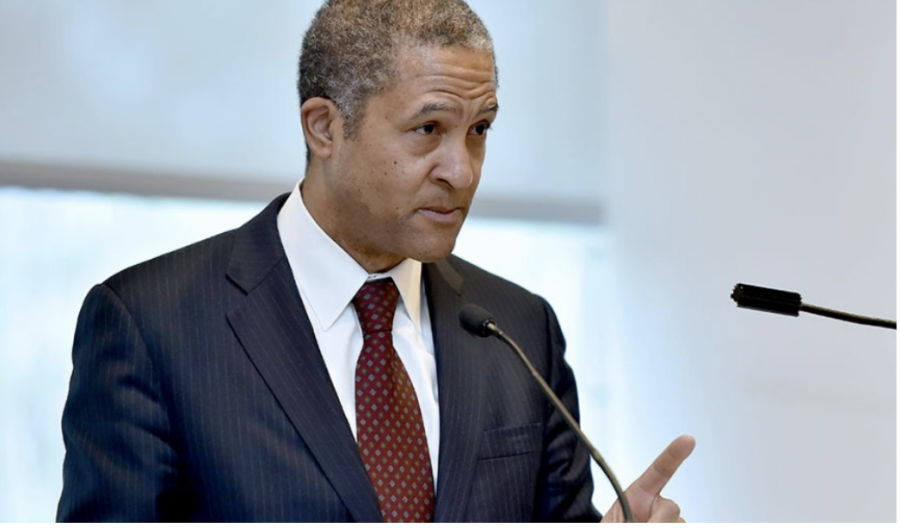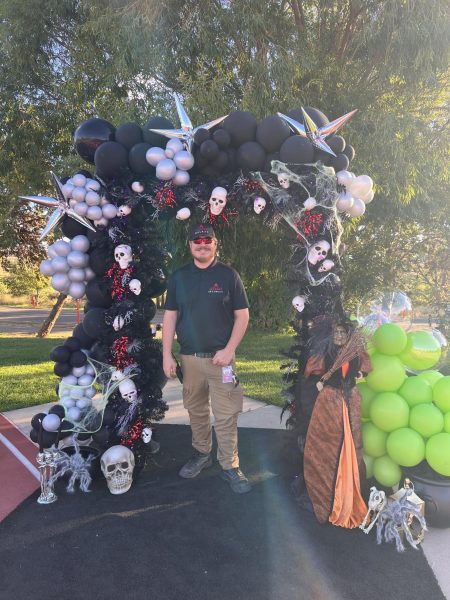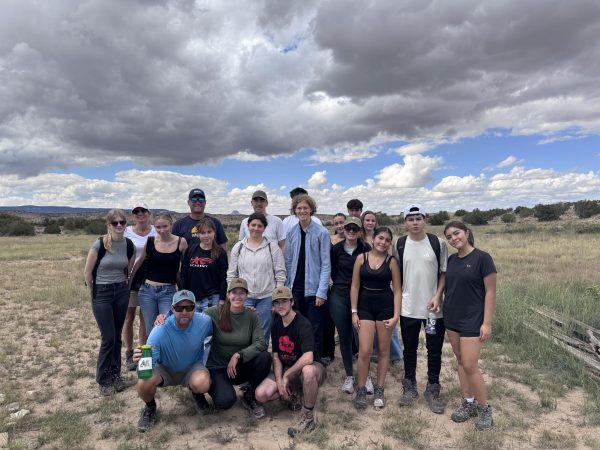Judge Raymond Lohier Inspires Justice Through Empathy
Judge Lohier of the U.S. Court of Appeals of the Second District visited Academy to discuss his life and career.
Judge Raymond Lohier of the United States Court of Appeals of the Second Circuit shakes my hand, his smile apparent even from behind his mask. He’s a former lawyer and longtime civil rights advocate who greets me with the utmost care, channeling a prosecutor’s precision into each word. His comfortable demeanor manages to offset the intimidation of his title without sacrificing its prestige. It’s a thin line to walk, but as we settle into our seats, I quickly learn that he’s used to reconciling beliefs and expectations.
Lohier had to take his status in stride when he became the first Black Chief of Narcotics in 2000. “So many people who are progressive, frankly, shy away from positions of power, including positions as prosecutors, and I often suggest that they should rethink, precisely because those are positions of power. I tried to change the focus of narcotics prosecutions so that it was less focused and targeted on particularly young men of color.”
The lessons he learned as the Chief of Narcotics later helped him to litigate white-collar crimes. His legal team prosecuted Bernie Madoff, a businessman, former NASDAQ chair, and, in Lohier’s words, “psychopath” who led the largest Ponzi scheme in history, scamming investors out of millions of dollars and bankrupting individuals and pension funds along the way. When U.S. government officials tapped Lohier for the case, his time spent with young offenders emboldened him to push for the maximum sentence. “I’d seen people who’d gone to prison for decades in their lives for selling crack cocaine. Why are we saying with this very wealthy person who’s had every advantage that [the maximum sentence is] too much? …These are again, people who for the most part, almost invariably have every advantage.” Lohier’s view prevailed― Madoff died in April while serving a 150-year prison sentence.
For Lohier, prosecuting crimes is an extension of civil rights work and his commitment to empathy, not a contradiction. “We have laws on the books that ban discrimination… I want some semblance of fair play.” Lohier doesn’t restrict his professional and personal relationships to colleagues with similar views on civil rights, forming alliances across ideological boundaries. “Empathy is the product of training,” he says firmly, leaning forward in his seat. “A big component of empathy is actually listening very carefully and trying to understand what someone with whom you might disagree vigorously, is actually saying. I’ve got these colleagues who have very different views. I listen to them very, very carefully and try to understand what’s driving the disagreement. It makes my thinking much better. It’s very easy when you’re playing chess to just brush the chess pieces of the other side off the board. It’s much harder to play chess.” According to Lohier, empathy is less of a balancing act and more of an opportunity for personal and societal growth. “It’s this idea of loving your fellow citizen, even as you disagree with her or him or them.”
Lohier’s use of inclusive language alludes to a broader recognition of recent social movements against strict gender roles. His face lights up when I ask for his perspective on Obergefell v. Hodges, the 2015 Supreme Court ruling that legalized same-sex marriage nationwide. “One of the most remarkable things in my lifetime has been the revolution of views and expectations about gender and gender identity… It happened very fast. I think it’s great.” He pointed out that United States v. Windsor, a 2013 Supreme Court case concerning marriage equality, proved that political affiliations often cannot predict a case’s outcome. “A Bush appointee was the person who wrote the majority [opinion]…The person who wrote the dissent was the Clinton appointee who strongly disagreed with the idea of marriage equality, in part because of his religious views. You can never tell based on the appointing authority what that judge will do.”
When I ask more generally about legal politicization, Lohier pauses before voicing his thoughts. “I am concerned about the public perception… that [the courts’] decisions are political.”
Of course, Lohier’s commitment to legal reform extends beyond gender and sexuality. As an immigrant, a child of immigrants, and a judge, Lohier has a uniquely thorough perspective on the U.S. immigration system and the recent violent expulsions of Haitian migrants. When I mention Title 42, the public health measure used by Presidents Donald Trump and Joe Biden to reject asylum appeals en masse, his response is as passionate as it is thoughtful. “I think that Congress over time — under both parties — has made it much harder to stay in this country… We are in a country where so many immigrants have contributed so greatly. That is lost on so many people.” The usually soft-spoken judge grows more animated, gesturing to emphasize his point.
Controversial, ongoing social issues like access to abortion elicit more reserved responses. When I ask Lohier if he thinks Roe v. Wade will be overturned by the upcoming Dobbs v. Jackson Women’s Health Organization case, he replies, “I can’t answer that” with good-natured humor that lightens his refusal. “I will say one thing… How [do you] overturn a case pursuant to which so many people have settled their expectations and have lived their lives? …How do you overturn that without significantly impairing confidence in institutions?” Ever aware of the power of leading questions, Lohier clarifies for the record that he’s not being rhetorical. He puts a lot of stock in the public confidence.
I walked into this interview with one overarching question: How can a public official advocate for progressive social change and uphold an oath to past precedents at the same time? Lohier doesn’t see a contradiction. Rather, he explains that legal oppression plays a significant role in undermining legitimacy: “Stability is extremely predictable. It is an extremely important feature of American governmental institutions. However, if you’re stable and you spit out consistently unjust results, that will lead to long-term instability because of a lack of public confidence.” From the attorney’s office to the judge’s bench, Lohier has fought for institutional stability, fairness, and equality. As he puts it, “There’s nothing genetic about justice. There’s nothing genetic that compels someone to pursue a life of justice for other people. It’s got to come from your experiences. From your empathy.”













George Ovitt • Nov 12, 2021 at 2:11 pm
What a great interview! This young journalist will someday be writing for the New Yorker. No nonsense, acute observations, smart questions, and interesting “sidebar” comments on the judge’s tone and demeanor. Thanks for this.